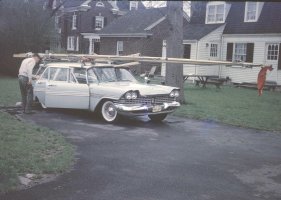I doubt anybody is doing it, Pete (re last sentence). Around here at least, and Maine is probably worse, the established institutions would not be, ah, supportive. For reasons you mention (regs, liability) and also political and class issues it's better not to go into.
Re Dave's challenges--I wonder if it isn't better here in California , with 12-month slips? Sure there's a sailing season, but weather permits year round work and there is no haul-out and launch reservation stuff, mast rigging, and so on, as in the frozen-water latitudes. What do you think?
I see the future of older boats more and more as DIY being the only solution. I asked the local blue chip engine service here ( CC Marine Services) for help with my mid-80s Universal diesel a few years ago, and the boss said his guys were not "trained" to work on old engines. Apparently it is not a good business model to employ mechanics who like to solve problems they're not "trained" for. Or maybe it is that owners of "old" engines don't want to pay for the hassle. New engines are the low hanging fruit, whereas I am an old high-hanging fruit (not the sort of thing people say to your face).
And anyhow, old boats don't make sense unless the owner is interested, curious, collects tools, expertise and experience and goes to school pretty much all the time. But it's easier than ever, as we all know, with YouTube and forums. It is a renaissance, maybe, in DIY for boats.
The newish 30-foot motorboat next to me? Every month a mechanic arrives, unpacks his tools, starts the engine, checks the fluids. Takes him two hours. I said, huh? "It's a service contract, people don't want to do it themselves." I had to stop calling the dockmaster every time his alarms went off for hours at a time, because a professional mechanic would show up in a service barge just to turn it off. "It's a service, sir, they don't want to do it themselves." Maybe the owner lives two hours away. But I happen to know he doesn't.
Bah. The implication is that you have to be rich. But in the olden days, our boatyard (Raritan Yacht Club, Perth Amboy), members did everything. They were doctors and lawyers and they scraped their own bottoms, so to speak. There was a marine railway that members used to haul 40-foot sailboats out, transfer them to greased planks, and winch them across the yard into spaces, and jack them up. I was 10 and it looked dangerous and it was. And I swallowed more copper bottom paint that dripped off my hair than I like remembering. The boats were wood. The sailing season was summer only. It all seems impossible, looking back. You raced in handicap races, went on a two-week family cruise, then then it was suddenly back to school and haul-out and frozen tarpaulins.
I probably am misled by memory or technicolor nostalgia or something, but it sure was different than fiberglass and Dacron. How they did it all themselves I don't know. It wasn't considered "DIY," it was considered owning a sailboat.
Things are better now, no matter how I remember it. That is true across the board, whenever I bother to think it through, although younger observers rarely agree. They don't remember polio and the draft and the assassinations. "It's a service, sir, people don't want to do that themselves."
Where was I ? Oh yeah, I conclude we pretty much have to do it ourselves, and I don't think that's new. Would anybody carry the mast of a 30-foot ketch on top of the family car today? I was about 18 at the time. It looks
crazy.
(even crazier when I enlarged the photo to discover both main and mizzen are on there. Herreshoff Design No. 30, each mast had one spreader)
View attachment 46025


